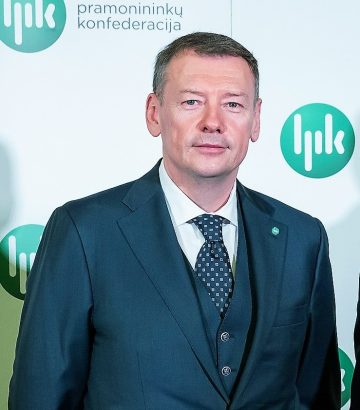We need to be ready to act in new conditions at any time

Vidmantas Janulevičius
President
The Lithuanian Confederation of Industrialists
Lithuania
The past year brought us a number of problems and challenges – fragile supply chains, geopolitical challenges that led to the closure of the No.1 raw material and component manufacturer of many Lithuanian companies – China. The events of the last few months in Ukraine have completely rebalanced the usual logistics routes, energy and raw material prices – making us even more vulnerable to shortages of these.
Baltic companies are most concerned about the short-term consequences of Russia’s invasion of Ukraine – higher energy, raw material and production costs. The long-term impact of Russia’s war is considered to be a change in logistics routes. A fifth of Lithuanian companies predict that business relations with certain regions will eventually become interrupted or restricted.
When the war broke out, supply chains from Russia, Belarus and Ukraine to Lithuania, both in terms of logistics and raw materials, were disrupted. Most importantly, this halted the supply of raw materials, forcing not only Lithuania, as well as the whole world, to frantically search for alternative suppliers of wood, biofuels, metal and other materials. It takes time to find alternative sources of supply. The key principles guiding businesses in their search for alternatives are the costs of raw materials and logistics, and the length of delivery. It is therefore logical that alternatives are sought as close to Lithuania as possible, before expanding the geography to a more global environment.
Business faces the same challenges when it comes to diversifying export markets. Business has learned to adapt quickly to new circumstances, but expanding and diversifying export markets takes time. Finding new markets, establishing a foothold and certifying products takes 5-7 years.
As a small and open economy, Lithuania has integrated quite well into the global economy and global value chains. But as the statistics for the first quarter of this year show, our economic interests are still mainly focused on our region and the EU market (apart from US and UK markets). Businesses are well aware that in this competitive environment, with rising costs, it will soon be very difficult to compete within the EU market, so they are looking for and will seek niche markets for their products. A principle exists that doubling the distance halves the number of economic relations, and the trends of the last 25 years prove it. Most of our direct economic interests have for many years been within a radius of 1500-2000 km, but this trend has been changing dramatically in the last few years.
The pandemic and global political tensions have exposed the inefficiencies and vulnerabilities of many supply chains, and businesses across Europe have been addressing these issues and looking for alternatives for some time. They are investing time and resources to re-evaluate their supply chains to find and address weaknesses.
Europe as a whole has now learned the harsh lessons, and Europe is now rapidly replacing “Made in China” with “Made in EU”, and Lithuania has been one of the lucky ones in this process. A third of new orders to factories have come as a result of the shift away from Asian suppliers. Now is the time when we can make this process irreversible, and what the Lithuanians have recovered from Asia can remain, provided we can secure raw materials at affordable prices and procure the necessary workforce.
Looking at the impact of global events and trends on Lithuania and its economy, the main focus today is on reviewing economic relations and how they affect prices. Europe, recovering from a pandemic, faces a situation in which it is economically tied (especially in terms of fuel and energy) to an aggressor state. This means that European countries and their economies will have to deal with the consequences of inflation caused by the pandemic and exacerbated by the energy price shock and the dilemmas of energy dependence.
Russia’s war in Ukraine has prompted the EU to reassess its relations with China. This European dependence on Russian energy resources has shown the EU the dangers that could await it if it increases its economic and trade dependence on China. Foreign experts say the era of huge Chinese investment in Europe may be coming to an end. German industrialists say that while Lithuania’s tensions with China have not yet had a direct impact on European businesses operating in China, the case of Lithuania has made it very clear to the whole EU that economic sanctions are a tool that China is willing to use as a response to political pressure. It is clear that the trend that started with COVID – to move production back to Europe or closer to home – is only going to gain more momentum, especially if issues of the energy sector are sorted.
Our geographic location, combined with regional and global trends, reminds us that we do not have the luxury of a predictable and stable environment and, unfortunately, we may not have such a luxury in the near future. We need to be ready to reorient and operate in new environments at any time, and diversification of export and raw material markets is an important prerequisite for a resilient economy.
Expert article 3287
>Back to Baltic Rim Economies 4/2022
To receive the Baltic Rim Economies review free of charge, you may register to the mailing list.
The review is published 4-6 times a year.
